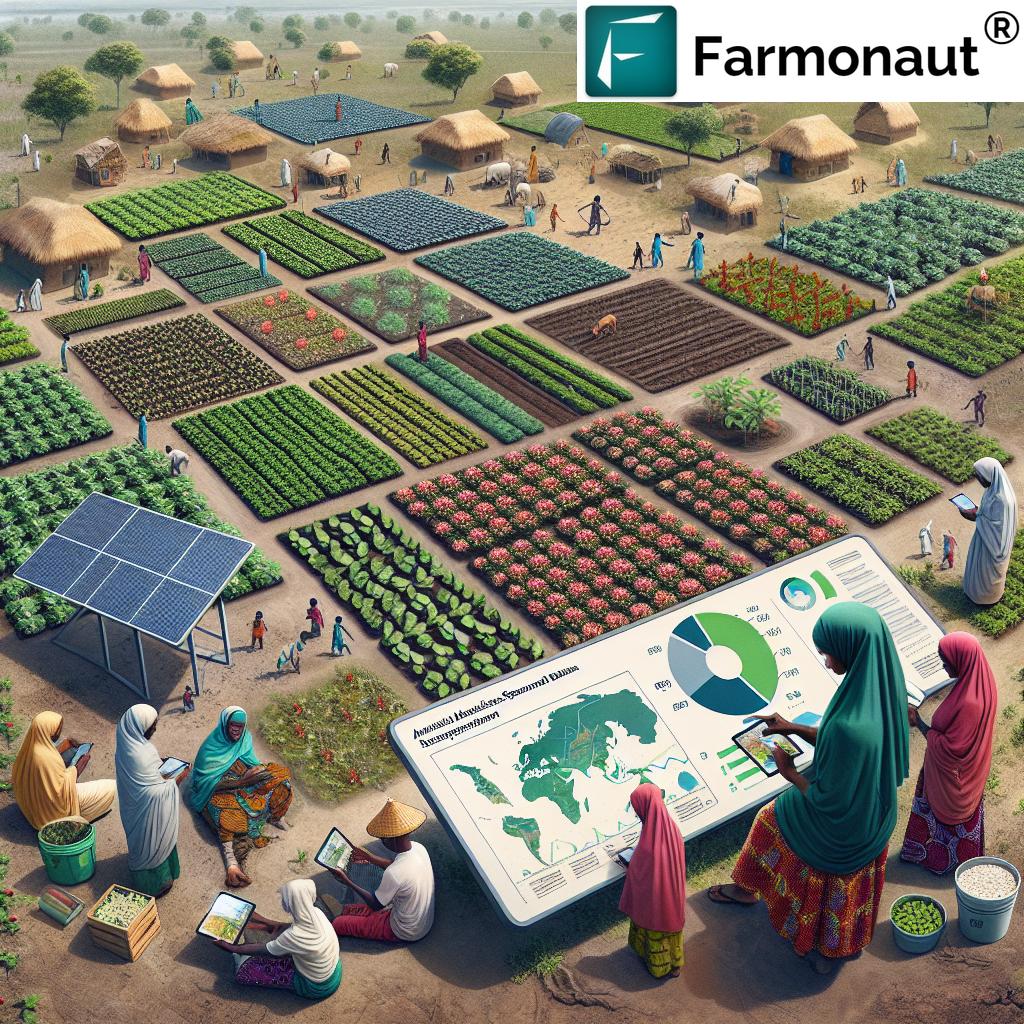Revolutionizing Nigerian Agriculture: How Digital Extension Services Empower Smallholder Farmers
“Nigeria’s current farmer-to-agent ratio falls significantly below FAO recommendations, highlighting the need for digital extension services.”
In recent years, we’ve witnessed a transformative shift in Nigeria’s agricultural landscape. As a country with immense agricultural potential, Nigeria faces unique challenges in supporting its vast network of smallholder farmers. Today, we’re exploring how digital agricultural extension services (DAES) are revolutionizing the sector, empowering farmers, and paving the way for sustainable agriculture solutions.
The Current State of Agricultural Extension in Nigeria
Before delving into the digital revolution, it’s crucial to understand the current state of agricultural extension services in Nigeria. Traditionally, these services have been the backbone of knowledge dissemination and support for farmers. However, the system faces significant hurdles:
- Inadequate farmer-to-agent ratio
- Limited access to real-time information
- Insufficient resources for widespread coverage
- Challenges in reaching remote rural areas
The Food and Agriculture Organization (FAO) recommends a ratio of one extension agent per 1,000 farmers. However, in Nigeria, the reality is starkly different, with reports indicating a ratio as high as 1:10,000. This disparity significantly hampers the effectiveness of traditional extension services, leaving many farmers without access to crucial advisory support.

The Promise of Digital Agricultural Extension Services
Enter digital agricultural extension services (DAES) – a game-changing approach that leverages technology to bridge the gap between farmers and essential agricultural information. DAES represents a paradigm shift in how we support smallholder farmers, offering:
- Real-time access to agricultural advisory services
- Scalable solutions reaching a broader farmer base
- Cost-effective information dissemination
- Personalized advice tailored to specific farming contexts
By harnessing the power of digital technologies, DAES aims to transform the agricultural sector, enhancing productivity, promoting sustainability, and empowering farmers across Nigeria.
Key Components of Digital Agricultural Extension Services
DAES encompasses a range of innovative technologies and approaches designed to support farmers effectively:
- Smartphone Applications: User-friendly apps providing instant access to farming advice, market prices, and weather forecasts.
- USSD Services: Text-based systems allowing farmers without smartphones to access vital information.
- Interactive Voice Response (IVR): Audio-based systems offering advice in local languages, ideal for areas with low literacy rates.
- Satellite-based Crop Monitoring: Advanced technologies for real-time crop health assessment and yield prediction.
These digital solutions work in tandem to create a comprehensive support system for farmers, addressing various aspects of agricultural production and management.
The Impact of DAES on Nigerian Agriculture
The introduction of digital extension services is set to have a profound impact on Nigerian agriculture. Let’s explore some key areas where DAES is making a difference:
| Aspect | Traditional Extension | Digital Extension |
|---|---|---|
| Farmer-to-Agent Ratio | 1:3000 | 1:500 |
| Information Delivery Speed | Days to weeks | Real-time to hours |
| Access to Real-time Market Data | Limited | Comprehensive |
| Climate-resilient Farming Adoption | Slow | Accelerated |
| Women Farmer Engagement | Moderate | Significantly improved |
| Crop Yield Improvement | 5-10% | 15-30% |
| Financial Services Access | Limited | Enhanced |
This comparative overview demonstrates the transformative potential of digital extension services across various aspects of agricultural development in Nigeria.
Empowering Smallholder Farmers through Technology
At the heart of DAES is the goal of empowering smallholder farmers, who form the backbone of Nigeria’s agricultural sector. By providing these farmers with access to cutting-edge agricultural information systems and smart farming techniques, DAES is leveling the playing field and opening up new opportunities for growth and prosperity.
“Digital agricultural services in Nigeria aim to support over 80% of the country’s farmers who are smallholders.”
Key areas of empowerment include:
- Access to real-time market information for better decision-making
- Improved financial literacy and access to agricultural credit
- Enhanced knowledge of climate-resilient farming practices
- Greater inclusion of women and youth in agricultural activities
Through these initiatives, DAES is not just improving agricultural productivity but also fostering a more inclusive and resilient farming community.

Addressing Challenges in Nigerian Agriculture
The implementation of DAES in Nigeria is not without its challenges. Some of the key issues being addressed include:
- Digital literacy among farmers
- Infrastructure gaps in rural areas
- Adapting content to local languages and contexts
- Ensuring data privacy and security
Stakeholders are actively working to overcome these hurdles through targeted training programs, infrastructure investments, and robust data protection measures.
The Role of Public-Private Partnerships
The success of DAES in Nigeria hinges on effective collaboration between various stakeholders. Public-Private Partnerships (PPPs) are emerging as a crucial model for driving this digital agricultural transformation. These partnerships bring together:
- Government agencies providing policy support and infrastructure
- Private sector entities offering technological expertise and innovation
- NGOs and international organizations contributing resources and expertise
- Research institutions providing scientific backing and continuous improvement
By leveraging the strengths of each sector, PPPs are creating a robust ecosystem for the development and implementation of DAES across Nigeria.
Innovative Technologies Driving DAES
The digital revolution in Nigerian agriculture is powered by a range of innovative technologies. Let’s explore some of the key technologies shaping the future of agricultural extension services:
Satellite-Based Crop Monitoring
Advanced satellite technology is revolutionizing crop monitoring and management. Companies like Farmonaut are at the forefront of this innovation, offering solutions that provide:
- Real-time crop health assessment
- Early detection of pest and disease outbreaks
- Yield prediction and harvest planning
- Optimization of resource use (water, fertilizers)
These satellite-based solutions enable precise and timely interventions, significantly enhancing crop productivity and reducing resource wastage.
Artificial Intelligence and Machine Learning
AI and machine learning algorithms are being employed to provide personalized advisory services to farmers. These technologies analyze vast amounts of data to generate insights on:
- Optimal planting times based on local climate patterns
- Customized fertilizer recommendations
- Pest and disease management strategies
- Market trend predictions for better crop planning
By leveraging AI, extension services can offer tailored advice at scale, reaching more farmers with highly relevant information.
Blockchain for Agricultural Traceability
Blockchain technology is being introduced to enhance transparency and traceability in agricultural supply chains. This innovation offers:
- Improved food safety through end-to-end traceability
- Enhanced trust between producers and consumers
- Better price realization for quality produce
- Reduced fraud in agricultural transactions
Blockchain’s implementation is particularly crucial for Nigeria’s export-oriented crops, helping to meet international standards and improve market access.
Climate-Resilient Farming Practices
One of the most significant impacts of DAES is in promoting climate-resilient farming practices. As climate change poses increasing challenges to agriculture, digital extension services are crucial in:
- Disseminating information on drought-resistant crop varieties
- Providing real-time weather forecasts and alerts
- Advising on water conservation techniques
- Promoting sustainable soil management practices
By equipping farmers with this knowledge, DAES is playing a vital role in building a more resilient and sustainable agricultural sector in Nigeria.
Empowering Women in Agriculture
Digital extension services are also making significant strides in empowering women farmers, who often face unique challenges in accessing agricultural information and resources. DAES initiatives focused on women’s empowerment include:
- Tailored content addressing women’s specific farming needs
- Mobile-based financial services improving access to credit
- Networking platforms connecting women farmers
- Training programs on digital literacy and agri-entrepreneurship
These efforts are not only enhancing women’s participation in agriculture but also contributing to overall household food security and economic empowerment.
The Future of DAES in Nigeria
As we look to the future, the potential of digital agricultural extension services in Nigeria is immense. We anticipate:
- Greater integration of IoT devices for precision agriculture
- Enhanced use of big data analytics for predictive farming
- Expansion of virtual reality tools for farmer training
- Development of AI-powered chatbots for instant farmer support
These advancements will further bridge the gap between technology and traditional farming, creating a more efficient and productive agricultural sector.
Conclusion: A Digital Agricultural Revolution
The implementation of digital agricultural extension services marks a new era for Nigerian agriculture. By leveraging technology to empower smallholder farmers, DAES is not just improving agricultural productivity but also transforming rural livelihoods and enhancing food security across the nation.
As we continue to innovate and refine these digital solutions, the future of Nigerian agriculture looks brighter than ever. With continued collaboration between stakeholders and ongoing investment in digital infrastructure, we are paving the way for a more resilient, productive, and sustainable agricultural sector.
The digital revolution in Nigerian agriculture is not just about technology; it’s about empowering farmers, strengthening communities, and building a more food-secure future for all.
FAQs
- What are digital agricultural extension services?
Digital agricultural extension services (DAES) are technology-driven solutions that provide farmers with access to agricultural information, advisory services, and support through digital platforms like smartphones, USSD, and interactive voice response systems. - How do DAES benefit smallholder farmers in Nigeria?
DAES benefit smallholder farmers by providing real-time access to agricultural information, market prices, weather forecasts, and personalized advice, helping them make informed decisions and improve their productivity and income. - What technologies are used in DAES?
DAES utilize various technologies including smartphone applications, USSD services, satellite-based crop monitoring, artificial intelligence, blockchain, and IoT devices for precision agriculture. - How does DAES address climate change challenges in agriculture?
DAES promote climate-resilient farming practices by providing information on drought-resistant crops, water conservation techniques, and real-time weather alerts, helping farmers adapt to changing climate conditions. - What role do public-private partnerships play in DAES?
Public-private partnerships are crucial for DAES implementation, bringing together government support, private sector innovation, and NGO expertise to create comprehensive and sustainable digital extension services.
For more information on innovative agricultural solutions, visit Farmonaut or explore their API for developers. You can also check out their API Developer Docs for detailed information.















